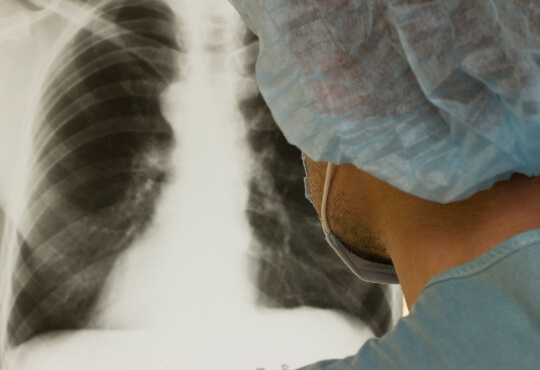Study: Mesothelioma Survival Rates Rise with SMART Protocol
Research & Clinical TrialsWritten by Tim Povtak | Edited By Walter Pacheco

Using accelerated high-dose radiation prior to surgery produced an unprecedented 65.9-month median survival for a cohort of pleural mesothelioma patients who were part of a larger clinical trial at the Princess Margaret Cancer Centre in Toronto.
Lancet Oncology recently published results of the study, named SMART, an acronym for Surgery for Mesothelioma After Radiation Therapy.
The SMART study involved 96 patients with pleural mesothelioma who were treated in Toronto from 2008 to 2019. All received the intensity-modulated radiotherapy before extrapleural pneumonectomy surgery, an unconventional treatment regimen.
Among the 96, there were 19 mesothelioma patients with the epithelial cell type and no lymph node involvement, producing the five-and-a-half-year median survival cohort.
According to the study, it was the first time a multimodal radical surgery clinical trial for pleural mesothelioma exceeded a five-year median survival.
“That number is almost unbelievable. I thought for a minute it might be a mistake. It was the super group,” Dr. John Cho, Toronto radiologist and lead study author, told The Mesothelioma Center at Asbestos.com. “I had to go back and double check everything. A very pleasant surprise. It showed, in some cases, you can do quite well with this disease.”
Mesothelioma Survival Soars for One Cohort
The majority of patients with pleural mesothelioma die within a year of diagnosis. Fewer than a third are even eligible for aggressive mesothelioma surgery, and for those who do qualify for surgery, the median survival is in the two-year range.
Princess Margaret Cancer Centre at the University of Toronto is one of the few facilities in North America using the SMART approach to treating pleural mesothelioma.
A more accepted, multimodality mesothelioma treatment typically starts with chemotherapy, follows with less-aggressive surgery and finishes with radiation, if necessary.
The theory behind using the radiation-first procedure is that it can better stimulate the patient’s immune system and decrease the cancer’s ability to seed or spill in the chest cavity during the surgery.
High-dose radiation can reduce mesothelioma recurrence by sterilizing edges of the tumor bed.
High-Dose Radiation Limits Surgical Options
The goal of the study was to evaluate the clinical feasibility of the SMART protocol.
One downside is that the high doses of radiation eliminate the option of leaving the lung intact. They require the surgeon to complete the extrapleural pneumonectomy surgery, which involves removing the diseased lung, the lining around it, the pericardium and major parts of the diaphragm.
Unfortunately, survival was not as good overall as it was for that optimal cohort of 19 patients.
When all 96 pleural mesothelioma patients were compiled together, the median overall survival was 24.4 months with a disease-free survival of 18 months.
The breakdown by cell type includes:
- Epithelial: The 69 patients with the epithelial variety had a median overall survival of 42.8 months and a median disease-free survival of 31.4 months.
- Biphasic: The 27 patients with the biphasic variety had a median overall survival of 18 months and a median disease-free survival of just 10.7 months.
Serious Side Effects Common with SMART
Unfortunately, serious side effects were common, a downside of the most aggressive surgery done with this disease. Grade 3 or 4 post-operative side effects occurred in 49% of the patients.
Many patients required recovery periods of three to six months before a return to a good quality of life.
“We were able to demonstrate a benefit from this treatment, the only study that has shown this kind of benefit,” Cho said. “But the benefit, at times, came at a pretty high cost.”
Most specialty centers today have moved away from the extrapleural pneumonectomy surgery and rely more on lung-sparing pleurectomy and decortication, which is aggressive but typically involves a shorter recovery time for patients.
Several previous studies have shown no advantages to the EPP surgery.
Princess Margaret Centre a Mesothelioma Treatment Leader
The Princess Margaret Cancer Centre is a well-known specialty center and a world leader in the treatment of mesothelioma. Lead thoracic surgeon Dr. Marc de Perrot is particularly renowned for his expertise.
“We’re trying to figure why this surgery in our hands seemed to do okay, but at other centers, it just hasn’t done as well,” Cho said. “We do warn other centers from trying to do this sort of treatment if they don’t have the expertise or experience.
“There is definitely a learning curve in handling these patients,” he said. “It’s going to be relatively tough for others to replicate this particular protocol.”
SMARTER Approach Also Used in Toronto
Although the SMART approach is still being used for more carefully selected patients, Princess Margaret is currently in the midst of a similar clinical trial that uses the pleurectomy decortication surgery instead. It is called SMARTER, or Surgery for Mesothelioma After Radiation Therapy using Extensive Resection.
SMARTER allows for a wider range of mesothelioma patients, admitting those who can’t tolerate the lung-removing surgery or its difficult recovery. The pre-surgery radiation dosage is lower, allowing the lung to remain.
The trial is trying to determine the optimal radiation dosage that still sparks the immune system but doesn’t damage the lung and force its removal.
“We’ve learned a lot from the SMART trial,” Cho said. “Our goal is to make the surgery safer, and still do a good job of jump starting the immune system. We believe in what we’re doing here, and that’s improving treatment.”






